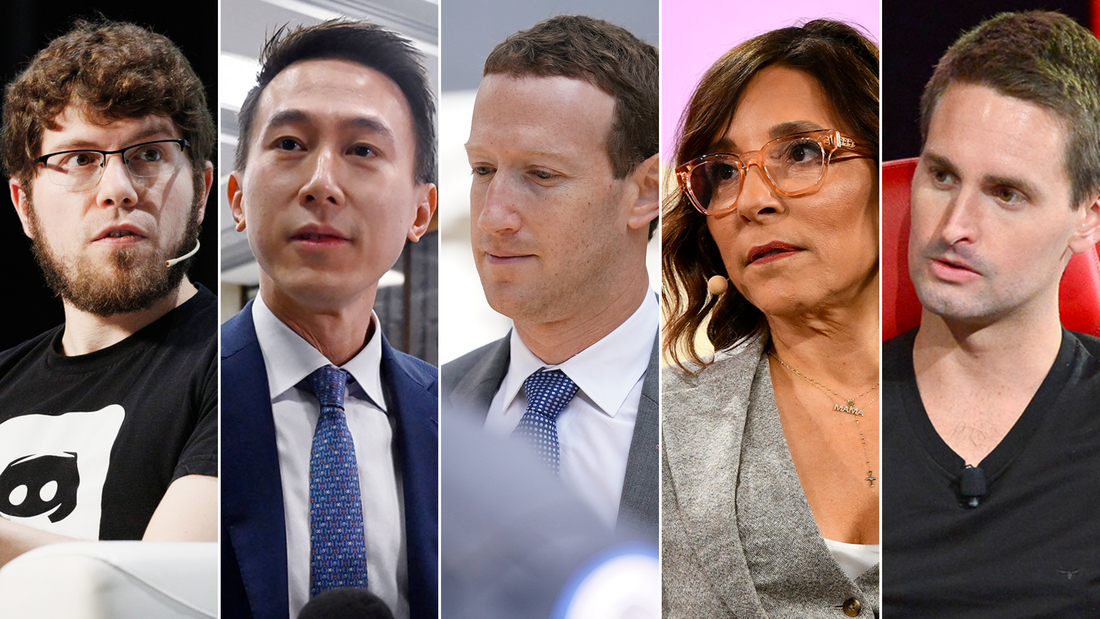A charged Senate Judiciary Committee hearing titled “Big Tech and the Online Child Sexual Exploitation Crisis,” CEOs of social media platforms faced questioning on the role their platforms play in online child safety.

Also Read: Zoom Unveils App for Apple’s Vision Pro Headset
The hearing featured Mark Zuckerberg, CEO of Meta, along with executives from TikTok, Discord, X, and Snap.
The focus was on child safety, with parents of victims in the audience, holding photos of their children who had experienced harassment, exploitation, and some who had taken their own lives.
Mark Zuckerberg delivered an apology directed at the families present at the hearing. Responding to Senator Josh Hawley‘s call for a direct apology, Mark Zuckerberg stood up and faced the audience, saying, “I’m sorry for everything you have all been through. No one should have to go through the things that your families have suffered.”
The apology came when criticism and a federal lawsuit against Meta, alleging intentional creation of psychologically manipulative features on Facebook and Instagram.
Senators grilled Mark Zuckerberg on various issues, with a focus on child safety, non-consensual explicit content, and the impact of social media on mental health.
Senator Ted Cruz confronted Mark Zuckerberg about Instagram’s warning screens for child sexual abuse material, questioning the rationale behind such prompts.
Senator Josh Hawley pressed Mark Zuckerberg on taking personal responsibility, asking if he would commit to compensating victims through a fund with his personal wealth.
Also Read: Elon Musk Says Neuralink Implanted First Wireless Brain Chip
Mark Zuckerberg’s response was non-committal, leading to a heated exchange. Senators Richard Blumenthal and Josh Hawley also referred to internal emails from Meta’s global affairs director, Nick Clegg, showing concerns about safety on Meta’s platforms.
The emails suggested a lack of investment hindering efforts to address issues like problematic use, bullying, and suicidal self-injury.
Meta is facing a federal lawsuit from multiple states, accusing Facebook and Instagram of intentionally creating features that contribute to addiction among children.
The lawsuit alleges that Meta hid internal data showing harm to young users. Mark Zuckerberg faced scrutiny over a Wall Street Journal investigation from 2021, revealing internal documents showing Meta knew about negative mental health effects of Instagram on teenagers.
Mark Zuckerberg disputed these details as facts, claiming selective presentation of research by Senator Hawley. Throughout the hearing, CEOs of TikTok, Discord, X, and Snap also faced questions.
Meta’s Zuckerberg addressed that the company has 40,000 people working in its trust and safety division. Other CEOs shared their commitment to safety measures and endorsed the Kids Online Safety Act (KOSA).
Parents of exploited children in the hearing, holding photos and wearing blue ribbons advocating for the passage of the Kids Online Safety Act (KOSA).
Also Read: Honor Magic V2 Review: 9.9mm Foldable Smartphone
They audibly expressed their discontent when Zuckerberg entered the hearing room. Senators from both parties expressed concerns about the impact of social media on children’s mental health and the rise of online child exploitation.
The bipartisan consensus said the urgency for legislative action. The Kids Online Safety Act (KOSA) emerged as a point, with some CEOs expressing support, while others remained non-committal.
Meta announced new safety measures, including default settings that prevent minors from receiving messages from strangers on Instagram and Messenger.
TikTok pledged a $2 billion investment in safety, while Snap’s CEO, Evan Spiegel, expressed support for the Kids Online Safety Act.
The hearing left some questions unanswered, particularly regarding regulations on social media platforms.
Senators expressed frustration with the lack of progress on federal legislation, addressing the need for collaboration between lawmakers and tech companies to address the challenges by online platforms.
While legislative efforts at the national level face problems, state legislators have introduced over 100 bills across the country to regulate children’s interaction with social media.
Also Read: Google Unveils Lumiere a Text to Video Creation AI




















